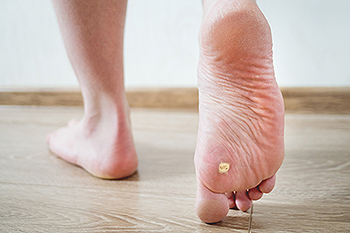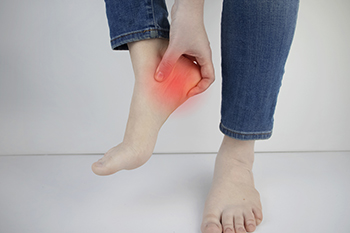August 2021
What Is Infectious Arthritis?
 Infectious arthritis is a sudden and painful form of arthritis caused by bacterial, viral, or fungal infections. This type of arthritis typically only affects one joint and can be caused by an infection spreading from one part of your body to the joint or joint lining, or by an infection-causing germ entering the body through open wounds, injections, or surgery. The symptoms of infectious arthritis include intense swelling, pain, fever, and chills. Although infectious arthritis usually affects the knees, it can also attack hips, wrists, and ankles. If you have symptoms of infectious arthritis in your ankle, a podiatrist may be able to help. For more information about the different types of arthritis, the effects of arthritis on your feet, and how to care for arthritic feet and ankles, please consult with a podiatrist.
Infectious arthritis is a sudden and painful form of arthritis caused by bacterial, viral, or fungal infections. This type of arthritis typically only affects one joint and can be caused by an infection spreading from one part of your body to the joint or joint lining, or by an infection-causing germ entering the body through open wounds, injections, or surgery. The symptoms of infectious arthritis include intense swelling, pain, fever, and chills. Although infectious arthritis usually affects the knees, it can also attack hips, wrists, and ankles. If you have symptoms of infectious arthritis in your ankle, a podiatrist may be able to help. For more information about the different types of arthritis, the effects of arthritis on your feet, and how to care for arthritic feet and ankles, please consult with a podiatrist.
Arthritis can be a difficult condition to live with. If you are seeking treatment, contact one of our podiatrists from Coastal Foot & Ankle Wellness Center, LLC. Our doctors can provide the care you need to keep you pain-free and on your feet.
Arthritic Foot Care
Arthritis is a term that is commonly used to describe joint pain. The condition itself can occur to anyone of any age, race, or gender, and there are over 100 types of it. Nevertheless, arthritis is more commonly found in women compared to men, and it is also more prevalent in those who are overweight. The causes of arthritis vary depending on which type of arthritis you have. Osteoarthritis for example, is often caused by injury, while rheumatoid arthritis is caused by a misdirected immune system.
Symptoms
- Swelling
- Pain
- Stiffness
- Decreased Range of Motion
Arthritic symptoms range in severity, and they may come and go. Some symptoms stay the same for several years but could potentially get worse with time. Severe cases of arthritis can prevent its sufferers from performing daily activities and make walking difficult.
Risk Factors
- Occupation – Occupations requiring repetitive knee movements have been linked to osteoarthritis
- Obesity – Excess weight can contribute to osteoarthritis development
- Infection – Microbial agents can infect the joints and trigger arthritis
- Joint Injuries – Damage to joints may lead to osteoarthritis
- Age – Risk increases with age
- Gender –Most types are more common in women
- Genetics – Arthritis can be hereditary
If you suspect your arthritis is affecting your feet, it is crucial that you see a podiatrist immediately. Your doctor will be able to address your specific case and help you decide which treatment method is best for you.
If you have any questions, please feel free to contact one of our offices located in St. Augustine, and Palatka, FL . We offer the newest diagnostic and treatment technologies for all your foot care needs.
Understanding Warts on the Feet
 A verruca is a small wart on the sole of the foot. They are more commonly known as plantar warts. Plantar warts can grow on the sole of the foot because of the human papillomavirus (HPV). This virus is contagious and thrives in warm and moist environments like locker rooms and swimming pools which makes plantar warts common for people who are barefoot in these communal areas. Plantar warts are not usually painful unless they are bearing weight. Some patients have found they may be tender to the touch as well. To avoid the spread of plantar warts, you should wear flip flops in communal areas such as pools, locker rooms, or showers. If you have a plantar wart that persists, consulting with a podiatrist and getting professional advice can be extremely beneficial.
A verruca is a small wart on the sole of the foot. They are more commonly known as plantar warts. Plantar warts can grow on the sole of the foot because of the human papillomavirus (HPV). This virus is contagious and thrives in warm and moist environments like locker rooms and swimming pools which makes plantar warts common for people who are barefoot in these communal areas. Plantar warts are not usually painful unless they are bearing weight. Some patients have found they may be tender to the touch as well. To avoid the spread of plantar warts, you should wear flip flops in communal areas such as pools, locker rooms, or showers. If you have a plantar wart that persists, consulting with a podiatrist and getting professional advice can be extremely beneficial.
Plantar warts can be very uncomfortable. If you need your feet checked, contact one of our podiatrists from Coastal Foot & Ankle Wellness Center, LLC. Our doctors will assist you with all of your foot and ankle needs.
About Plantar Warts
Plantar warts are the result of HPV, or human papillomavirus, getting into open wounds on the feet. They are mostly found on the heels or balls of the feet.
While plantar warts are generally harmless, those experiencing excessive pain or those suffering from diabetes or a compromised immune system require immediate medical care. Plantar warts are easily diagnosed, usually through scraping off a bit of rough skin or by getting a biopsy.
Symptoms
- Lesions on the bottom of your feet, usually rough and grainy
- Hard or thick callused spots
- Wart seeds, which are small clotted blood vessels that look like little black spots
- Pain, discomfort, or tenderness of your feet when walking or standing
Treatment
- Freezing
- Electric tool removal
- Laser Treatment
- Topical Creams (prescription only)
- Over-the-counter medications
To help prevent developing plantar warts, avoid walking barefoot over abrasive surfaces that can cause cuts or wounds for HPV to get into. Avoiding direct contact with other warts, as well as not picking or rubbing existing warts, can help prevent the further spread of plantar warts. However, if you think you have developed plantar warts, speak to your podiatrist. He or she can diagnose the warts on your feet and recommend the appropriate treatment options.
If you have any questions please feel free to contact one of our offices located in St. Augustine, and Palatka, FL . We offer the newest diagnostic and treatment technologies for all your foot and ankle needs.
Foot Pain and Walking
 Foot pain may become worse while walking. Many patients experience occasional aches and pains in their feet, and chronic pain may indicate serious or underlying foot conditions. Pain in the heel may represent plantar fasciitis, which is an inflammation of the plantar fascia. This is the portion of tissue that connects the heel to the toes, and may feel worse upon arising in the morning. A condition that affects the nerves in the foot may indicate Morton’s neuroma, and the pain is often felt in the ball of the foot. In severe cases, it may gravitate to the toes, which can cause the entire foot to feel uncomfortable. There are several types of tendinitis that can cause severe pain. When the Achilles tendon is affected, the heel and calf are targeted. Extensor tendonitis can cause the top of the foot pain and discomfort, and the outside and back of the foot can be affected by peroneal tendonitis. Any type of foot pain warrants a visit to the podiatrist, who can properly diagnose and treat painful foot conditions.
Foot pain may become worse while walking. Many patients experience occasional aches and pains in their feet, and chronic pain may indicate serious or underlying foot conditions. Pain in the heel may represent plantar fasciitis, which is an inflammation of the plantar fascia. This is the portion of tissue that connects the heel to the toes, and may feel worse upon arising in the morning. A condition that affects the nerves in the foot may indicate Morton’s neuroma, and the pain is often felt in the ball of the foot. In severe cases, it may gravitate to the toes, which can cause the entire foot to feel uncomfortable. There are several types of tendinitis that can cause severe pain. When the Achilles tendon is affected, the heel and calf are targeted. Extensor tendonitis can cause the top of the foot pain and discomfort, and the outside and back of the foot can be affected by peroneal tendonitis. Any type of foot pain warrants a visit to the podiatrist, who can properly diagnose and treat painful foot conditions.
Foot Pain
Foot pain can be extremely painful and debilitating. If you have a foot pain, consult with one of our podiatrists from Coastal Foot & Ankle Wellness Center, LLC. Our doctors will assess your condition and provide you with quality foot and ankle treatment.
Causes
Foot pain is a very broad condition that could be caused by one or more ailments. The most common include:
- Bunions
- Hammertoes
- Plantar Fasciitis
- Bone Spurs
- Corns
- Tarsal Tunnel Syndrome
- Ingrown Toenails
- Arthritis (such as Gout, Rheumatoid, and Osteoarthritis)
- Flat Feet
- Injury (from stress fractures, broken toe, foot, ankle, Achilles tendon ruptures, and sprains)
- And more
Diagnosis
To figure out the cause of foot pain, podiatrists utilize several different methods. This can range from simple visual inspections and sensation tests to X-rays and MRI scans. Prior medical history, family medical history, and any recent physical traumatic events will all be taken into consideration for a proper diagnosis.
Treatment
Treatment depends upon the cause of the foot pain. Whether it is resting, staying off the foot, or having surgery; podiatrists have a number of treatment options available for foot pain.
If you have any questions, please feel free to contact one of our offices located in St. Augustine, and Palatka, FL . We offer the newest diagnostic and treatment technologies for all your foot care needs.
Do Your Child's Feet Hurt?
Signs of Plantar Fasciitis
 Plantar fasciitis is one of the most leading causes of heel pain. It can occur when the plantar fascia, the band of tissues that run along the bottom of the foot connecting the heel to the toes, becomes inflamed or torn. Plantar fasciitis may result in a sharp or dull pain at the bottom of the foot near the heel that is most severe in the morning. Pain may also intensify after carrying weight and cause the heel to swell. There are a variety of factors that can contribute to plantar fasciitis that include excessive training, rapid weight gain, a change in activity, tight calf muscles, improper footwear, and flat feet. Patients who are suffering with heel pain and think they may have plantar fasciitis should consult with a podiatrist for a proper diagnosis.
Plantar fasciitis is one of the most leading causes of heel pain. It can occur when the plantar fascia, the band of tissues that run along the bottom of the foot connecting the heel to the toes, becomes inflamed or torn. Plantar fasciitis may result in a sharp or dull pain at the bottom of the foot near the heel that is most severe in the morning. Pain may also intensify after carrying weight and cause the heel to swell. There are a variety of factors that can contribute to plantar fasciitis that include excessive training, rapid weight gain, a change in activity, tight calf muscles, improper footwear, and flat feet. Patients who are suffering with heel pain and think they may have plantar fasciitis should consult with a podiatrist for a proper diagnosis.
Plantar fasciitis can be very painful and inconvenient. If you are experiencing heel pain or symptoms of plantar fasciitis, contact one of our podiatrists from Coastal Foot & Ankle Wellness Center, LLC. Our doctors can provide the care you need to keep you pain-free and on your feet.
What Is Plantar Fasciitis?
Plantar fasciitis is the inflammation of the thick band of tissue that runs along the bottom of your foot, known as the plantar fascia, and causes mild to severe heel pain.
What Causes Plantar Fasciitis?
- Excessive running
- Non-supportive shoes
- Overpronation
- Repeated stretching and tearing of the plantar fascia
How Can It Be Treated?
- Conservative measures – anti-inflammatories, ice packs, stretching exercises, physical therapy, orthotic devices
- Shockwave therapy – sound waves are sent to the affected area to facilitate healing and are usually used for chronic cases of plantar fasciitis
- Surgery – usually only used as a last resort when all else fails. The plantar fascia can be surgically detached from the heel
While very treatable, plantar fasciitis is definitely not something that should be ignored. Especially in severe cases, speaking to your doctor right away is highly recommended to avoid complications and severe heel pain. Your podiatrist can work with you to provide the appropriate treatment options tailored to your condition.
If you have any questions please feel free to contact one of our offices located in St. Augustine, and Palatka, FL . We offer the newest diagnostic and treatment technologies for all your foot and ankle needs.
Ingrown Toenail Treatments
Ingrown toenails are an annoying but typically mild problem that occurs when the corner or edge of a toenail grows into the surrounding skin, rather than over it. This can cause the skin to become red, swollen, tender, or painful. Ingrown toenails can often be managed with home treatment and footwear modifications. Over the counter anti-inflammatory medications can reduce pain and swelling. Sometimes an ingrown toenail can result in an infection. Your podiatrist can prescribe antibiotics if this occurs. When it comes to the ingrown toenail itself, your podiatrist may remove the ingrown part of the nail through a procedure called partial nail avulsion. To prevent ingrown toenails, it is suggested that you trim your toenails straight across and not too short using nail clippers, and that you wear shoes that are not too tight in the toes. For more information about ingrown toenails, please consult with a podiatrist.
Ingrown toenails may initially present themselves as a minor discomfort, but they may progress into an infection in the skin without proper treatment. For more information about ingrown toenails, contact one of our podiatrists of Coastal Foot & Ankle Wellness Center, LLC. Our doctors can provide the care you need to keep you pain-free and on your feet.
Ingrown Toenails
Ingrown toenails are caused when the corner or side of a toenail grows into the soft flesh surrounding it. They often result in redness, swelling, pain, and in some cases, infection. This condition typically affects the big toe and may recur if it is not treated properly.
Causes
- Improper toenail trimming
- Genetics
- Improper shoe fitting
- Injury from pedicures or nail picking
- Abnormal gait
- Poor hygiene
You are more likely to develop an ingrown toenail if you are obese, have diabetes, arthritis, or have any fungal infection in your nails. Additionally, people who have foot or toe deformities are at a higher risk of developing an ingrown toenail.
Symptoms
Some symptoms of ingrown toenails are redness, swelling, and pain. In rare cases, there may be a yellowish drainage coming from the nail.
Treatment
Ignoring an ingrown toenail can have serious complications. Infections of the nail border can progress to a deeper soft-tissue infection, which can then turn into a bone infection. You should always speak with your podiatrist if you suspect you have an ingrown toenail, especially if you have diabetes or poor circulation.
If you have any questions, please feel free to contact one of our offices located in St. Augustine, and Palatka, FL . We offer the newest diagnostic and treatment technologies for all your foot care needs.









